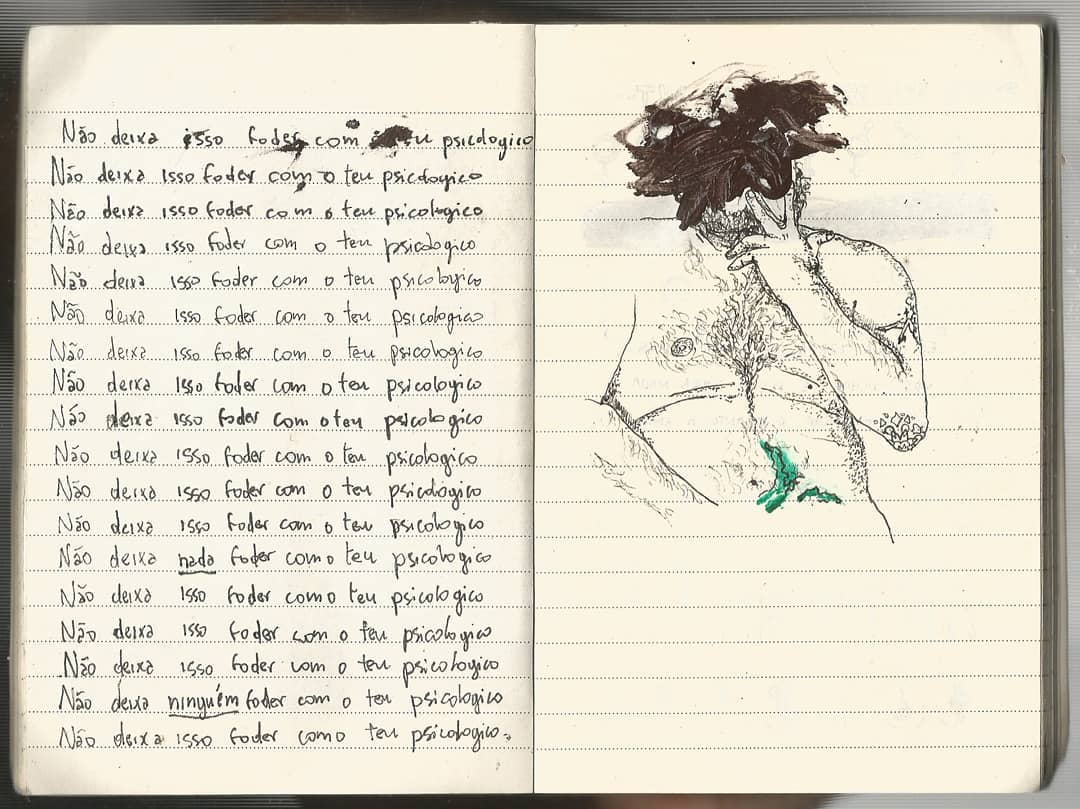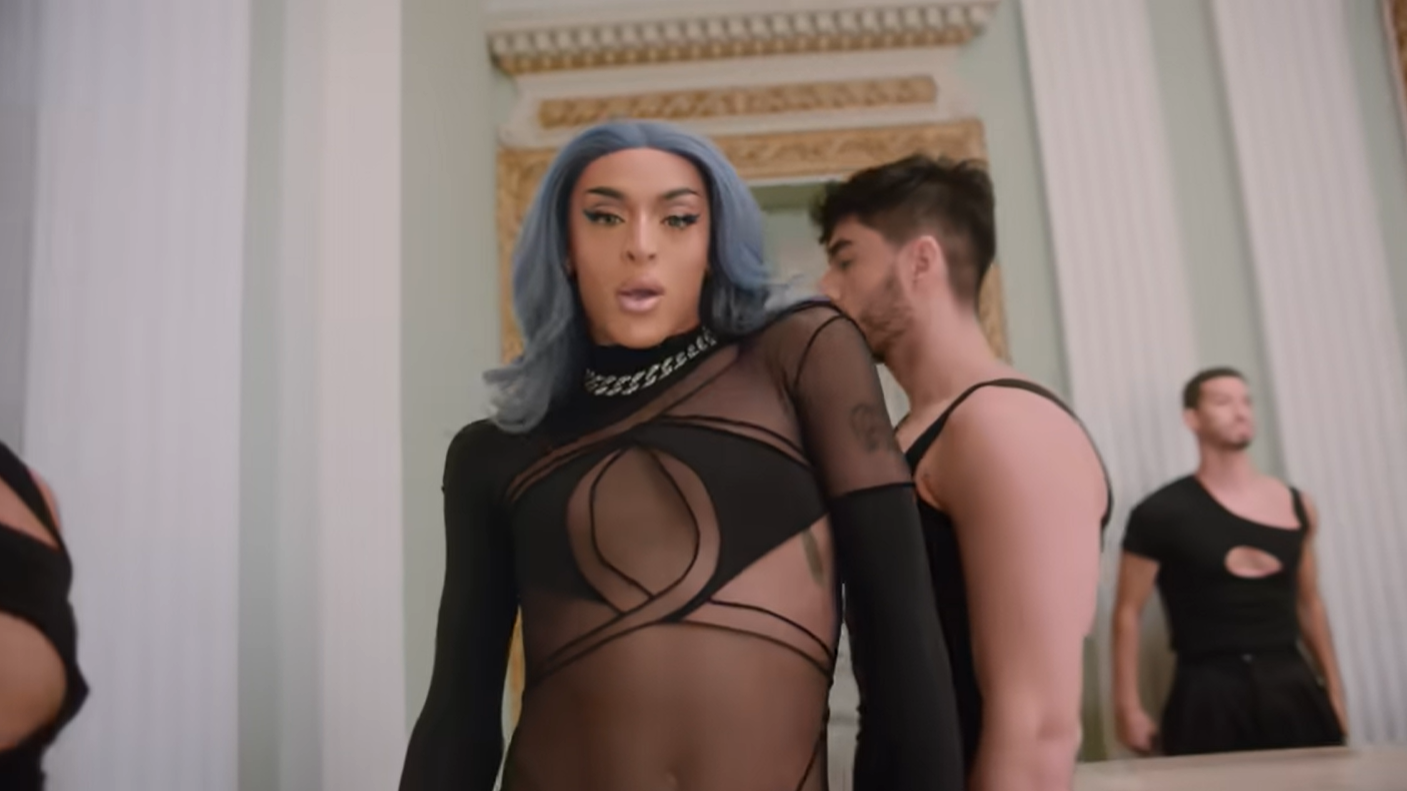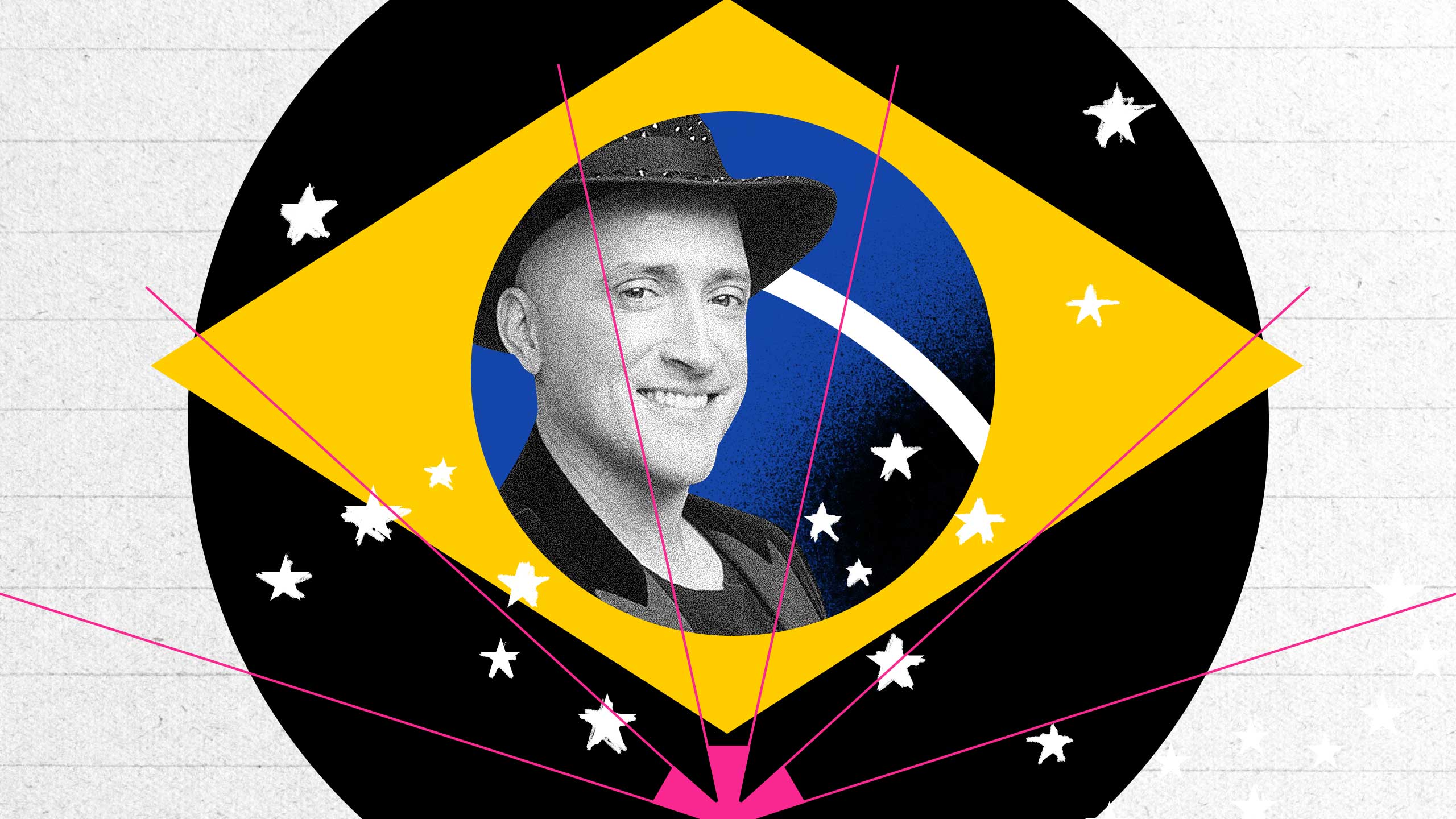The death this May of Paulo Gustavo—an openly gay actor, comedian and playwright who stole the hearts of Brazilians with his outrageously loveable character of Dona Hermínia—was not just tragic because Brazil lost a great talent, a drag performer whose comedic films and satirical sketches challenged conservative prejudices in Brazilian society.
For LGBTQ+ Brazilians, the loss of Gustavo to COVID-19 is also symbolic of the shrinking space in the mainstream for the country’s openly queer cultural producers. Paulo’s high profile allowed him to create satire subverting homophobia by making fun of those who only see the straight side of Brazil. One of his characters, Senhora dos Absurdos (“Lady of Absurdities”), acted out the blatant discrimination against poorer people and LGBTQ+ people, showcasing the snobbish hypocrisy of Brazilian elites who see themselves as superior to so-called lower classes because they follow the rules of white colonial heterosexuality; Gustavo’s jokes were played on the powerful.
The 2018 election of ultra-conservative president Jair Bolsonaro, a man who has publicly said he is proud to be a homophobe, has emboldened right-wing groups to push for censorship of LGBTQ+ art and entertainment in Brazil. Gustavo’s preventable death, in a country where the government has repeatedly refused to supply the population with the COVID-19 vaccine, was a reminder to queer artists and culture producers of their fragile position in Brazilian society.
The Bolsonaro administration made a point of solidifying the national conservatism that LGBTQ+ populations have been fighting against for decades. In 2018, Brazil’s largest queer art exhibition, Queermuseu (“Queer Museum”), was censored due to protests by right-wing groups and later was forced to open at a different location and relying on crowdfunding after losing the public grants they had received in the past. In 2019, the mayor of Rio, who is an evangelical pastor and supported Bolsonaro’s presidential election, censored a comic book that showed a kiss between two men that was being sold at the Bienal do Livro book fair; city inspectors were deployed to take away unsold copies of the offending book. Political forces continue to target queer voices—voices that are losing space through lack of funding, unexplained cancelled exhibitions and veiled acts of censorship.
Queer artists who want funding and exposure must now that their chances, not knowing how an increasingly conservative public will interpret what they’re making and how this easily offended constituency will weaponize local and federal governments to silence them. Henrique Montagne, a queer artist based in the city of Belém, in the northern state of Pará, had his May exhibition cancelled without explanation by the sponsor Banco da Amazônia after he tagged the funding body on an Instagram post about the exhibition. The show, Suaves Brutalidades (“Soft Brutalities”), brings together seven years of visual art exploring relationships between men and the masculine body in their at once soft and brutal narratives.

After winning the funding from Banco da Amazônia through an open call for submissions, Montagne worked on the exhibition for months and invested his own money, which the funding body had committed to reimbursing. However, just two days before the exhibition was meant to start, it was cancelled; COVID-19 safety precautions were apparently to blame (however, according to Montagne, turning it into a virtual exhibition was not even considered).
“I can’t say for sure that it was censorship, but the question remains: What’s so bad about my exhibition that it cannot be shown virtually?” Montagne tells me during a WhatsApp interview from his home. “Producing LGBTQ+ culture in Brazil is very complicated. You end up trying to be more respectable in your proposals [to funding bodies] which limits our creative freedom as artists. Not many LGBTQ+ projects have been approved lately, or they’re made to be invisible or heavily criticized by the public due to ignorance. I believe LGBTQ+ culture is really losing space in Brazil.”
The cancellation has been embarrassing for Montagne, who was also left with 25,000 reals (about USD$4,800) in debt, though, after public pressure, the bank eventually agreed to cover it. News of the cancellation spread in art circles, but the international attention Montagne received did not outweigh his frustration. “I received a lot of support from people from other states and around the world,” he says. “But I also felt humiliated as an artist. I really felt like giving up. And this says a lot about how LGBTQ+ people are living nowadays. We are just surviving, trying to find alternative ways to communicate and connect so we can resist the genocidal and reactionary Bolsonaro government during a pandemic.”
“The creators of the show were forced to cancel because their funding was granted through a public call for submissions.”
In Itajaí, in the southern state of Santa Catarina, a May livestream to launch a podcast called Criança Viada Show (“Faggot Child Show”), was forced to shut down by the city’s mayor. The podcast and the livestream, organized by the LGBTQ+ organization Ações Para Reexistir (“Actions for Re-existing”), were meant to explore the memories of gay men who use art to speak about their childhood trauma of growing up in a cis-heteronormative society. The city claimed to have received complaints from the public that the show was a “paedophilia apology” and “teaching children how to have sex.” It released an official memo demanding the suspension of the event because it might go against the country’s “Children and Adolescents Statute,” a piece of legislation that protects the rights of children—one that has increasingly been used to “protect” children from LGBTQ+ ideas and images. The creators of the show were forced to cancel because their funding was granted through a public call for submissions.
“We already clarified our intentions publicly in our social media accounts,” said project creator and artist Daniel Olivetto. “People don’t want us to speak about our existence and our perspectives. What’s worse is they’re using pro-family rhetoric, accusing us of sexualizing children. This is unfounded. Talking about gender and sexuality is not sexualizing children. We are trying to protect queer children. We are being treated like a group of irresponsible people.”
Olivetto says the misinformation spread by officials about the project has subjected the group to homophobic harassment. “Censorship was a heavy blow, but the hatred we’ve been receiving from conservative sectors of society is way scarier,” he says. “Elected officials who have been sharing homophobic hatred online are encouraging other people to do the same. And then people feel like they can post offensive content on our social media accounts. This is about prejudice.”
“Who are they attacking? People who are seeking to expand the discourse. It’s a daily struggle.”
One commenter, for example, claimed that the planned livestream, which of course never aired, was about promiscuity. “Promiscuidade não se faz com dinheiro público! O choro é livre!” they wrote. (“Promiscuity will not be paid for with public funding! Cry about it!”) Another commenter congratulated the city for the action: “Parabéns ao governo e a Prefeitura. Dinheiro do pagador de impostos para custear putaria, NÃO,” they wrote. (“Congratulations to the government and the city. Taxpayer money isn’t for paying for prostitution, no!”)
Even without open directives for censorship from the federal government, homophobic local politicians and members of the public have felt emboldened to attack local organizations and artists, says Olivetto. And none of it seems accidental. “This government appears to be a disaster, but it isn’t. It’s a fascist project in its essence. The LGBTQ+ community, artists, thinkers and educators have been broadly attacked. It’s a project for a totalitarian state. And who are they attacking? People who are seeking to expand the discourse. It’s a daily struggle.”
Roberta Ribeiro Cassiano, a philosophy professor and editor of the feminist lesbian magazine Brejeiras, says LGBTQ+ art and culture goes against two of the central tenets of the Bolsonaro administration: hatred of arts and culture and hatred of LGBTQ+ people. Bolsonaro’s low regard for the arts has been clear from the second day he took office, when he dismantled the Ministry of Culture. Additionally, under his administration, some of Brazil’s biggest cultural institutions have been under threat. The Brazilian film library in São Paulo was forced to dismiss staff last August due to funding cuts. Recent reports have revealed that around a thousand films might have already become unusable because they have not been maintained properly.
“Those two editions completely sold out. We did this with no support or funding.”
“There’s an intersection between the hatred for culture and the hatred for LGBTQ+ people that hits LGBTQ+ cultural resistance really hard,” says Cassiano, who is from Rio de Janeiro. “Bolsonaro’s political performance is completely founded on the logic of moral panics and reinforcing racist, patriarchal, LGBT-phobic and ‘anti-communist’ structures of oppression. In this sense, culture and the LGBTQ+ population were always his targets, and this double hatred reinforces his image as a ‘messiah’ who is uniquely able to save his followers from these ‘dangers.’”
Of course, queer culture has not disappeared. But the scene has become more radical and urgent, less about commercial success, and more about LGBTQ+ people addressing and supporting each other.
“We have been creating safe spaces for cultural production and the strengthening of communities,” Cassiano says. “Since the tolerance from official institutions has been taken away, we have lost the illusion of assimilation, of docility, of ‘tolerant’ coexistence and now we can create in a way that is more free, committed to ethical solidarity principles and rejecting the authorities who want us dead.”
Brejeiras, a publication made for and by lesbians, is a perfect example. Cassiano, who is the co-founder, says the magazine is thriving: the events they organized before the pandemic were attended by hundreds of queer women. This shows there is still fertile ground for LGBTQ+ cultural spaces in Brazil through modes of resistance.
“The success of the Brejeiras’ events motivated us to print a thousand copies of the magazine instead of the original hundred we had printed, in a space of three months,” Cassiano says. “Those two editions completely sold out. We did this with no support or funding, only through building support networks and through community media and journalism.”
Though there is freedom and pride in creating culture without traditional support from government and sponsors, Cassiano says it’s a case of making the best of a bad situation. “I’m not celebrating the structural and financial precarity of this kind of production,” she says.

But it’s the mainstream artists and entertainers who can reach the hearts and minds of straight Brazilians. Despite the efforts of Bolsonaro and his followers, the Brazilian queer community still has stars at the national and international level: Pabllo Vittar, Liniker, Marcus Majella, Linn da Quebrada and many others resist the government while creating popular culture.
Paulo Gustavo was special because he found his success in making fun of the conservative, heteronormative culture that has oppressed LGBTQ+ folks for so long. His comedic skits celebrated being a slutty fag and called out homophobic elites. His Dona Hermínia character accepted her gay son, which inspired queer people from all walks of life to come out to their families. His public life as a gay man, with a husband and two sons, presented an alternative vision of the family in a country where, like in many others, the idea of the traditional heterosexual family is thrust upon LGBTQ+ people as the norm.
Gustavo’s greatest achievement was in how he loved those around him and how he expressed that love through his art. During a comedy special at the end of last year, after the whole country had experienced tragedy after tragedy during the pandemic, he declared: “Laughter is an act of resistance.” May we all find joy and laughter in resisting these dark times.


 Why you can trust Xtra
Why you can trust Xtra


